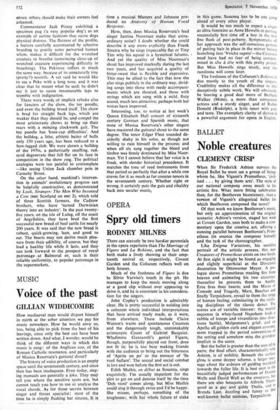OPERA
Spry old timers
RODNEY MILNES
There can scarcely be two hardier perennials in the opera repertoire than The Marriage of Figaro and La Boheme, and the fact that both make a lively showing at their ump- teenth revival at, respectively, Covent Garden and the Coliseum reflects well on both houses.
Much of the freshness of Figaro is due to Silvio Varviso's touch in the pit. He manages to keep the music moving along at a good clip without ever appearing to drive it, and he is consistent in his considera- tion for the singers.
John Copley's production is admirably clear. He is pretty successful in welding into a coherent whole individual interpretations that have arrived ready made, as it were, from elsewhere. These include Claire Watson's warm and spontaneous Countess and the dangerously tough, unmistakably aristocratic Count of Gabriel Bacquier. Wladimiro Ganzarolli's genial Figaro, though, purposefully played out front, does not fit in; he is too busy making friends with the audience to bring out the bitterness of 'Aprite un pa' or the menace of `Se vuol ballare'. The sexual and social combat is loFt and won before the first act is out.
Edith Mathis, en debut as Susanna, sings exquisitely. I'm usually impatient for the plot to get on and denoue itself by the time `Deh vieni' comes along, but Miss Mathis could sing it through twice and I'd be happy. She misses, perhaps, something of the toughness:, with her whole future at stake
in this game, Susanna has to be one jump ahead of every other player.
It would be too much to expect a singer as ultra-feminine as Anne Howells to portray successfully first time off a boy in the first fine flush of post-puberty. Symptomatic of her approach was the self-conscious gesture of patting hair in place in the mirror before launching into `Voiche sapete'—the Countess need have had no fear of being compro- mised in tete a tete with this pretty pouter. But Miss Howells sings nicely, and the randiness will come later.
The freshness of the Coliseum's Boheme is due mostly to the youth of the singers. Credibility makes all the difference to this deceptively subtle work. We will obviously be hearing a good deal more of Barbara Walker (Mimi), a more than competent actress and a sturdy singer, and of Robin Donald (Rudolph), a lyric tenor with guts and taste. The exemplary clarity of diction is a powerful argument for opera in English.






















































 Previous page
Previous page